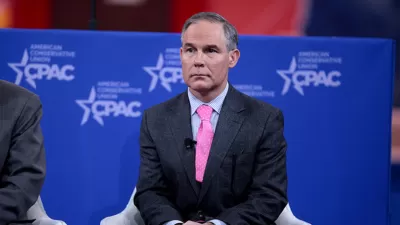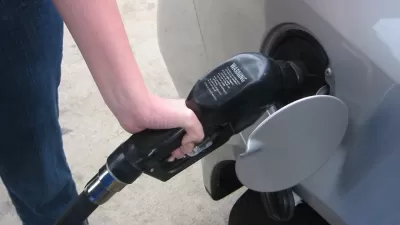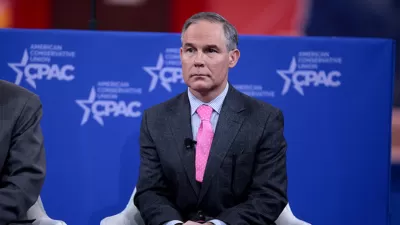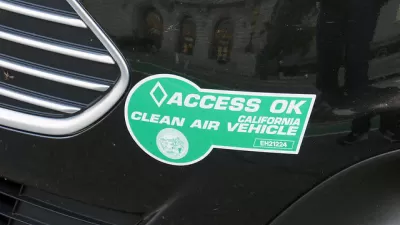Perhaps there never really was much difference between 'skepticism' and 'denial'. Scott Pruitt certainly proved that on Thursday when he answered CNBC's Joe Kernen's question if carbon emissions are the primary cause of climate change.

Joe Kernen and Andrew Ross Sorkin, co-anchors of CNBC's "Squawk Box", engage in a wide-ranging, 11-minute Q & A (video) on Thursday with U.S. Environmental Protection Agency Administrator Scott Pruitt that touch many issues covered by Planetizen since Pruitt's confirmation (when he was labeled a climate skeptic) on Feb. 17, including the rollbacks, proposed or accomplished, of:
- Fuel efficiency standards for model year 2022-2025 passenger vehicles
- Clean Power Plan rule
- Waters of the United States (WOTUS) rule [see presidential executive order]
- Methane information collection request
However, the real issue exposed was Pruitt's belief, or more accurately, disbelief, on the roles of carbon emissions and human activity in climate change, thanks to Kernen's simple yet insightful question asked at the very last minute (see 1:12 minute video) of the interview. Had the prior 10-minutes of Q and A not occurred, though, I wonder if Pruitt would have answered as directly, rather than evasively, as he did. Kernen asks:
Just to get to the nitty gritty, do you believe that it's been proven that CO2 is the primary control knob for climate?
Pruitt responds:
No, I think that measuring with precision human activity on the climate is something very challenging to do and there is tremendous disagreement** about the degree of impact, so no, I would not agree that it's a primary contributor to the global warming that we see, but we don't know that yet, so we need to continue the debate and review and analysis.
"That view contradicts the stance of the Environmental Protection Agency itself, as well as the conclusion of NASA (National Aeronautics and Space Administration) and the National Oceanic and Atmospheric Administration (NOAA)," writes Tom DiChristopher for CNBC on reactions from the political, environmental, and science communities.
Sen. Tom Carper, the ranking Democrat on the Senate Committee on Environment and Public Works, tweeted about the comment, "I think 97% of the world's scientists were surprised to learn this today! I know I was."
Carper was referring to a frequently cited study that found 97 percent of climate scientists who issued findings on the cause of climate change ascribe the phenomenon to human activity. Those findings have been disputed.
The EPA lists carbon dioxide as composing 81 percent of greenhouse gas emissions in 2014.

Courtesy of E.P.A.: Overview of Greenhouse Gases
Ironically, CNBC's Kernen, who expresses uncertainty about the the role of carbon dioxide as a pollutant during the interview, ends with a statement about climate denial (courtesy of Media Matters):
But I don’t want to be called a denier, so it scares me. It’s a terrible thing to be called. Anyway, administrator Pruitt, I know you don’t want to be called that either...
Pruitt was in Houston to appear as a guest speaker for the oil industry gathering known as CERA (previously Cambridge Energy Research Associates) Week. Pruitt told Kernan that he wanted to convey to them a message that you can be pro-growth, pro-jobs, and pro-environment.
Coral Davenport of The New York Times also reports on Scott Pruitt's admission that carbon emissions are not the primary driver of climate change.
**Science Daily defines the Global Warming Controversy, derived from Wikipedia, and notes that "there is also a small but vocal number of scientists in climate and climate-related fields that disagree with the consensus view."
FULL STORY: Scott Pruitt's latest climate change denial sparks backlash from scientists, environmentalists

Alabama: Trump Terminates Settlements for Black Communities Harmed By Raw Sewage
Trump deemed the landmark civil rights agreement “illegal DEI and environmental justice policy.”

Planetizen Federal Action Tracker
A weekly monitor of how Trump’s orders and actions are impacting planners and planning in America.

The 120 Year Old Tiny Home Villages That Sheltered San Francisco’s Earthquake Refugees
More than a century ago, San Francisco mobilized to house thousands of residents displaced by the 1906 earthquake. Could their strategy offer a model for the present?

Ken Jennings Launches Transit Web Series
The Jeopardy champ wants you to ride public transit.

BLM To Rescind Public Lands Rule
The change will downgrade conservation, once again putting federal land at risk for mining and other extractive uses.

Indy Neighborhood Group Builds Temporary Multi-Use Path
Community members, aided in part by funding from the city, repurposed a vehicle lane to create a protected bike and pedestrian path for the summer season.
Urban Design for Planners 1: Software Tools
This six-course series explores essential urban design concepts using open source software and equips planners with the tools they need to participate fully in the urban design process.
Planning for Universal Design
Learn the tools for implementing Universal Design in planning regulations.
Clanton & Associates, Inc.
Jessamine County Fiscal Court
Institute for Housing and Urban Development Studies (IHS)
City of Grandview
Harvard GSD Executive Education
Toledo-Lucas County Plan Commissions
Salt Lake City
NYU Wagner Graduate School of Public Service





























